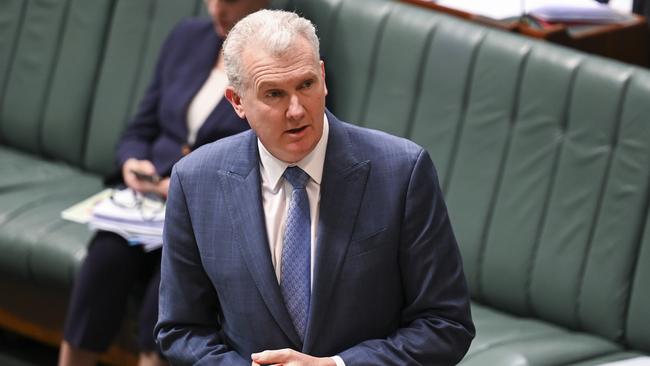Labor’s smashing small business with new rules and regulations while unions get a pass
Radical, Greens-inspired policies around casual work and the right to disconnect are hurting Australia’s largest employer, small business, writes Luke Achterstraat.

Opinion
Don't miss out on the headlines from Opinion. Followed categories will be added to My News.
As tens of thousands of CFMEU members protested in unlawful rallies across the country, many small businesses were prevented from opening their doors.
Commuters and workers alike were disrupted as the CFMEU chanted “hands off our union” across streets in Sydney, Melbourne, Brisbane, Adelaide and Perth.
Administration of the CFMEU is a good first step, but the Albanese Government must also introduce an independent industry regulator, co-ordinate law enforcement agencies in response and provide protection for witnesses and whistleblowers.
A culture of intimidation cannot be stamped out by simply rearranging the deck chairs.
During the same week of this unlawful behaviour, small businesses have witnessed the introduction of complex new laws that make their life much harder.
A radical rewrite of casual employment and a new “right to disconnect” will both undermine small business confidence.

Casual employment provides flexibility for small businesses, and an attractive casual loading of 25 per cent for casual workers.
Yet a more complex, 15-factor definition of casuals discourages smaller employers from engaging a young person seeking casual work.
The Greens-inspired “right to disconnect” law has been introduced as a one-sits-fits-all policy, when the matter of workplace communication is better dealt between employer and employee, not the government in Canberra.

Small businesses have 12 months to adjust to this change, but damage has been done through a signal from government that employers cannot be trusted to contact their own staff appropriately.
Our workplace laws have now disconnected from reality by stigmatising communication between its own participants. What is and isn’t “reasonable” contact between employer and employee now faces judgment from a tribunal. It is a case of a regulatory solution in search of an actual problem.
The latest IR changes also boost union access into workplaces, an incredulous fact when trade union membership is in decline and amidst latest revelations of criminal behaviour.
It is a sad irony that thousands of small businesses doing the right thing are grappling with a more complex and costly regime this week.
Small businesses do not have armies of lawyers or HR teams. They incur great cost and time to simply keep up to date with the ever-changing landscape.
The Fair Work Act already comprised 1200 pages, and the latest changes create more than 600 pages of additional legislation.

Most disappointingly, no credible impact statement was provided into the legislation, with a bizarre assumption made in the modelling that a small business would only need 15 minutes to enact an entire change to an employment classification.
Small business is the largest private employer in Australia, yet our IR system continues to put small business owners on the endangered list whilst union delegates remain a protected species.
Australia needs a workplace relations system that rewards productive and harmonious workplaces. Small businesses seek a fair set of rules that encourage employment, innovation and reward.
The next election may well be a referendum on better and fairer workplace laws in Australia.
A good starting point is to support the millions of small employers that want to get on with running their business in a lawful manner.
Luke Achterstraat is CEO of COSBOA




